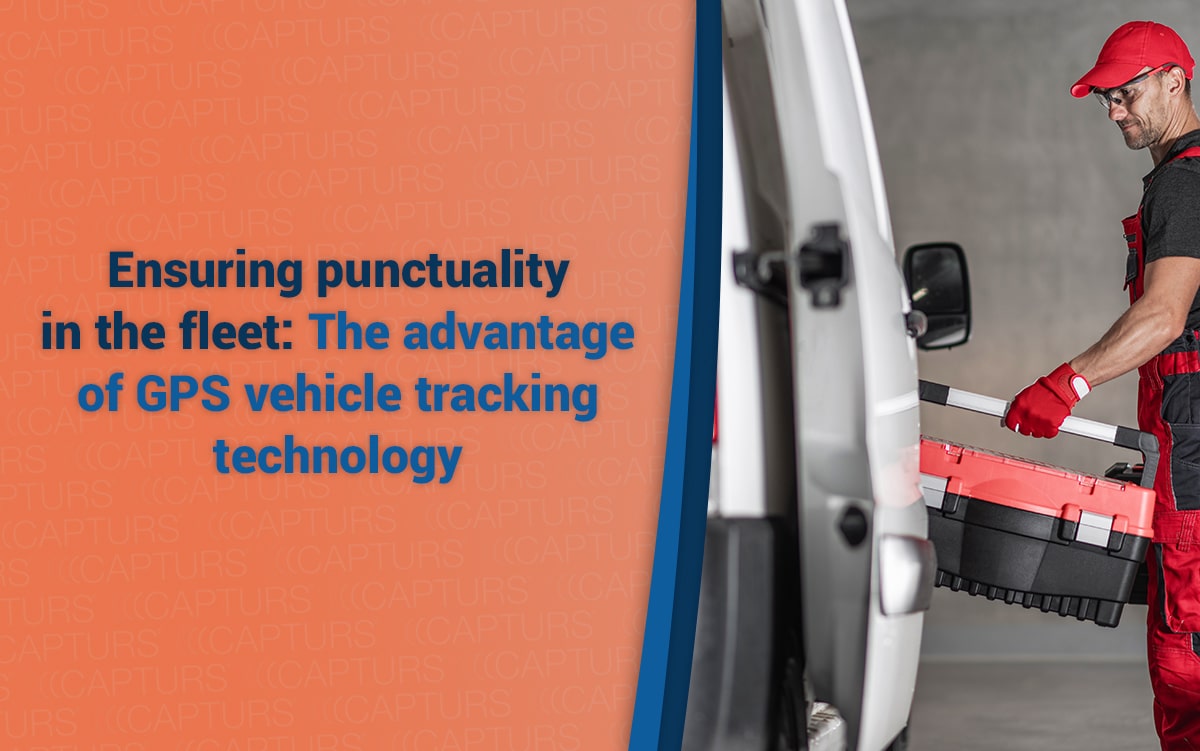Ensuring fleet punctuality: The advantage of GPS vehicle tracking technology

Effective management and monitoring of a fleet of vehicles is crucial for companies that depend on them for their business. Punctuality is a key aspect of this management, as it has a direct impact on productivity, profitability and customer satisfaction. GPS trackers have become an essential tool for companies to monitor their fleet of vehicles and verify on-time performance.
This article will explore the use of GPS trackers for fleet on-time performance verification. We’ll look at how GPS trackers can be used to track the location of vehicles in real time and collect valuable data to verify on-time performance. We will also see how this technology is used in different sectors and how it can be used to improve the punctuality of vehicle fleets. Finally, we will propose recommendations for the effective use of GPS trackers to improve the punctuality of vehicle fleets.
GPS trackers for punctuality verification
How GPS trackers work
GPS (Global Positioning System) trackers are devices that locate and track the position of a vehicle in real time via satellites. These devices usually consist of a box containing a GPS receiver, a communication modem and a battery. They are installed on board vehicles and regularly communicate their position to an online tracking platform via an internet or telephone connection.
GPS trackers allow to follow in real time the position of the vehicles and to collect data on their movement, such as their speed, their route, their driving time, etc. This data can be used to verify the accuracy of the vehicle’s position. This data can be used to verify the punctuality of vehicles by comparing scheduled and actual departure and arrival times. GPS trackers can also be used to verify that vehicles are following the planned routes and to detect driving deviations (such as excessive speed).
In addition to tracking the location of vehicles, GPS trackers can also be used to track vehicle driving parameters, such as speed, acceleration and braking. This allows companies to monitor drivers and detect unsafe or inappropriate behavior, thereby improving road safety.
GPS trackers can track the location of vehicles in real time, collect data on their movement and use it to check vehicle punctuality, optimize routes, and monitor drivers for better road safety.
The advantages of GPS trackers for punctuality verification
GPS trackers offer many benefits for fleet on-time verification. Here are some of the key benefits:
Real-time tracking: GPS trackers provide real-time vehicle location tracking, allowing companies to continuously track the location of their vehicles and verify on-time performance through historical tracking of each vehicle in the fleet.
Accurate data collection: GPS trackers collect accurate data on vehicle movement, such as route, speed, driving time, etc. This data can be used to verify the accuracy of the vehicle’s location. This data can be used to check the punctuality of vehicles and to optimize routes, but also to calculate working times.
Improved productivity: By using GPS trackers to check vehicle on-time performance, companies can improve productivity by avoiding delays and optimizing routes. Employees can be more efficient in their company cars.
Improved communication: GPS trackers allow companies to communicate in real time with their drivers, allowing on-time performance issues to be resolved quickly.
Improved road safety: GPS trackers can also be used to monitor drivers for unsafe or inappropriate behavior, thereby improving road safety.
Save time: By using GPS trackers to check on-time performance, companies can save time by automating vehicle tracking and reducing human error.
In summary, GPS trackers offer many benefits for fleet on-time verification, such as real-time tracking, accurate data collection, improved productivity, better communication, improved road safety and time savings.

Data collected by GPS trackers and their use to verify punctuality
GPS trackers can collect a large amount of data on vehicle movements, such as route, speed, driving time, etc. This data can be used to check the punctuality of vehicles and to optimize routes. This data can be used to check the punctuality of vehicles and to optimize routes.
Route: GPS plotters record the route taken by vehicles, allowing verification that vehicles are on schedule.
Speed: GPS trackers record the speed at which vehicles were driven, allowing detection of speeding and action to improve road safety.
Driving time: GPS trackers record the amount of time a vehicle is driven, which can be used to verify that drivers have complied with regulatory driving time limits.
Stops: GPS trackers record vehicle stops, which can be used to verify that drivers have respected break and stop times.
Fuel consumption data: GPS trackers can also record fuel consumption data, allowing companies to monitor costs and take steps to improve fuel efficiency.
Using this data, companies can verify the on-time performance of their vehicles by comparing the data recorded by the GPS trackers with the scheduled times. Companies can also use this data to optimize routes and reduce costs by minimizing unnecessary trips and delays, as well as find out if employees are using vehicles for personal, off-duty purposes.
In summary, GPS trackers can collect a large amount of data about vehicle movements, such as route, speed, driving time, etc., which can be used to check vehicle punctuality and optimize routes.

Use of fleet monitoring technology for on-time performance
The different sectors of use
Fleet monitoring technology is used in many sectors to improve punctuality and optimize vehicle movements. Here are some examples of sectors of use:
Transportation: Transportation companies use fleet monitoring technology to check the punctuality of trucks and buses and to optimize routes. This improves customer satisfaction and reduces costs.
Delivery: Delivery companies use fleet monitoring technology to track the movements of delivery trucks and bicycles and to check the punctuality of deliveries. This improves customer satisfaction and reduces costs.
Public services: Public services, such as fire and police departments, use fleet monitoring technology to track the movements of emergency vehicles and to check the punctuality of interventions. This improves responsiveness and safety.
Agriculture: Farmers use fleet monitoring technology to track the movements of tractors and agricultural machinery, to check the timeliness of tasks and to optimize routes. This improves production efficiency and reduces costs.
Logistics: Logistics companies use fleet monitoring technology to track the movements of trucks and containers and to check the punctuality of movements. This improves supply chain planning and reduces costs.
In summary, fleet monitoring technology is used in many sectors to improve on-time performance and optimize vehicle movements. It is used in transportation, delivery, utilities, agriculture, logistics, etc.

Benefits for companies
There are many benefits for companies using fleet monitoring technology to improve on-time performance:
Improved customer satisfaction: Fleet monitoring technology allows companies to check the punctuality of vehicles and meet delivery deadlines. This improves customer satisfaction and strengthens the company’s reputation.
Cost reduction: Fleet monitoring technology allows companies to optimize vehicle routes and movements. This reduces fuel costs and vehicle maintenance costs.
Increased productivity: Fleet monitoring technology allows companies to track vehicle movements and verify the timeliness of tasks. This increases employee productivity and efficiency.
Improved safety: Fleet monitoring technology allows companies to track vehicle movements and verify the punctuality of tasks. This improves the safety of employees and customers.
Better planning: Fleet monitoring technology allows companies to track vehicle movements and verify the punctuality of trips. This allows for better planning of trips and tasks.
In summary, fleet monitoring technology allows companies to improve punctuality, optimize routes, reduce costs, increase productivity, improve safety and better plan trips. It is therefore a crucial tool for companies wishing to improve their performance and profitability.

Use cases
Data analysis to detect punctuality problems
Data analysis is a key element in detecting on-time performance problems in vehicle fleets. GPS trackers collect real-time data on vehicle position, speed and movement. This data can be analyzed to detect on-time performance issues and identify causes.
Travel tracking: Vehicle position and speed data can be used to track vehicle movements and detect delays or route deviations.
Identify causes of delays: Position and speed data can also be used to identify causes of delays, such as traffic jams, road works, etc.
Analyze downtime: Position data can be used to analyze vehicle downtime and detect unplanned or excessive stops.
Driver performance tracking: Speed and travel data can be used to track driver performance and identify drivers with on-time performance issues.
Using data analytics, companies can detect on-time performance issues in their fleets and take steps to resolve them. This helps improve vehicle travel efficiency and customer satisfaction.
Implementing strategies to improve on-time performance
After identifying on-time performance issues through data analysis, it is important to implement strategies to improve the on-time performance of the vehicle fleet. GPS trackers can be used to implement these strategies and monitor their effectiveness.
Route optimization: GPS trackers can be used to optimize vehicle routes based on real-time traffic data and weather conditions. This minimizes delays and maximizes vehicle utilization.
Driver performance monitoring: GPS trackers can be used to monitor driver performance and identify drivers with on-time performance issues. Companies can then implement training or coaching programs to improve driver performance.
Real-time communication with drivers: GPS trackers can be used to communicate with drivers in real time and provide them with information about routes, delays, etc. This ensures that drivers have all the information they need to meet deadlines.
Vehicle maintenance tracking: GPS trackers can be used to track vehicle maintenance and ensure that vehicles are in good working order. This helps prevent breakdowns and delays due to mechanical problems.
By implementing strategies to improve fleet on-time performance, companies can improve travel efficiency and customer satisfaction. GPS trackers can be used to monitor the effectiveness of these strategies and continue to improve them.
Monitoring and Evaluating Results
Once strategies to improve on-time performance have been implemented, it is important to monitor and evaluate the results to ensure that they are effective. GPS trackers can be used to track on-time performance data and evaluate the results of different strategies.
Tracking performance indicators: GPS trackers can be used to track performance indicators such as distance traveled, driving time, number of kilometers traveled, etc. This allows for tracking of the progress of the project. This allows you to monitor the progress of the fleet and evaluate the effectiveness of the strategies implemented.
On-time performance data analysis: GPS trackers allow you to monitor on-time performance data for each vehicle and driver. This allows you to evaluate the effectiveness of strategies in place and identify areas that need improvement.
Cost Tracking: GPS trackers allow you to track costs related to vehicle use, such as fuel costs, maintenance costs, toll costs, etc. This allows you to evaluate the effectiveness of strategies in place and identify areas where savings can be realized.
Evaluating customer feedback: GPS trackers track customer feedback on on-time performance and service. This allows you to evaluate the effectiveness of strategies in place and identify areas for improvement.
By tracking and evaluating the results of implemented strategies, companies can continue to improve the effectiveness of their fleet and customer service. GPS trackers can be used to track on-time data and monitor the progress of the vehicle fleet.

